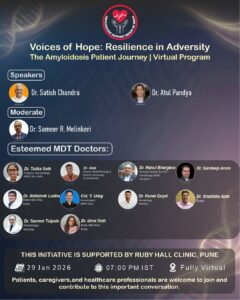Table of Contents
The Growing Need for Geriatric Expertise: Why It Matters — And How It Connects with Amyloidosis Awareness
Aging Population: A Global Wake-Up Call
We are living in a time of remarkable demographic transformation. Across the globe, the population is aging at a rate never seen before. With increasing life expectancy and decreasing birth rates, older adults are becoming a significant portion of our societies. But with this shift comes a critical need: healthcare systems must evolve to meet the unique and complex medical needs of aging individuals.
Enter geriatric care — a specialized branch of medicine focused on older adults. No longer a niche, it’s fast becoming a cornerstone of sustainable, inclusive healthcare systems.
Why Geriatric Expertise Is EssentialAs we age, the human body undergoes a variety of changes:
- We become more susceptible to chronic illnesses
- The immune system weakens
- Organ function declines
- Cognitive and physical impairments become more common
- Medication side effects and drug interactions become riskier
These factors make diagnosing and treating older adults more complex than simply applying standard care. That’s where geriatric professionals — including physicians, nurses, therapists, and social workers — play a crucial role.
They are trained not only to understand the biology of aging, but also to manage multiple co-existing conditions, adjust treatments for increased sensitivity to medications, and support patients’ emotional and social needs.
The Geriatric Approach: Personalized, Preventive, and Compassionate
Geriatric care isn’t just about managing diseases — it’s about holistic well-being.
Geriatricians focus on:
- Preventive care (vaccinations, screenings)
- Chronic disease management (e.g., diabetes, arthritis, heart conditions)
- Medication management
- Support for independent living
- Promoting healthy aging (nutrition, fitness, mental health)
This personalized care model emphasizes preserving independence, dignity, and quality of life for older adults.
Amyloidosis and Aging: An Overlooked Connection
One condition that highlights the importance of geriatric awareness is amyloidosis — a rare, underdiagnosed disorder caused by the accumulation of abnormal amyloid proteins in tissues and organs.
Though amyloidosis can affect any age group, certain types disproportionately affect older adults. Because its symptoms mimic common age-related conditions, it is often misdiagnosed or detected too late.
Why Amyloidosis Is Harder to Detect in Older Adults
Symptoms of amyloidosis may include:
- Unexplained fatigue
- Swelling in ankles or legs
- Numbness in hands or feet
- Weight loss
- Irregular heartbeat
- Shortness of breath
These symptoms are often mistaken for heart failure, kidney issues, or neuropathy — all common among seniors. As a result, diagnosis may be delayed, increasing the risk of organ damage.
Importance of Early Diagnosis in Seniors
The key to managing amyloidosis is early detection and intervention. Delayed treatment can lead to:
- Heart failure
- Kidney dysfunction
- Liver damage
- Peripheral nerve complications
That’s why geriatrics and multidisciplinary care teams are so vital. Cardiologists, nephrologists, hematologists, and neurologists must collaborate to diagnose and treat amyloidosis in elderly patients.
Why Geriatric Expertise Can Save Lives
With growing age-related health risks, especially rare conditions like amyloidosis, investing in geriatric training and awareness isn’t optional — it’s essential.
Key benefits of geriatric expertise:
- Earlier recognition of complex conditions like amyloidosis
- Better medication management for aging bodies
- Improved patient satisfaction and independence
- Reduced hospitalizations and healthcare costs
How You Can Support Aging with Dignity
Whether you’re a healthcare provider, caregiver, policymaker, or individual:
- Educate yourself about age-specific diseases like amyloidosis
- Encourage older adults to report vague or persistent symptoms
- Support geriatric training in medical institutions
- Advocate for early screenings and diagnosis in older populations
- Raise awareness on social media and within communities
Conclusion: Building a Future That Honors Aging
Amyloidosis is just one example of how aging bodies require more nuanced and expert care. As our population ages, geriatric care must become the norm, not the exception.
By understanding the needs of older adults and preparing our systems to address rare diseases like amyloidosis, we can create a healthier, more equitable future for all generations.
🔗 Learn more at: https://amyloidosissupport.in
📢 Share this post. Spark awareness. Improve lives.

